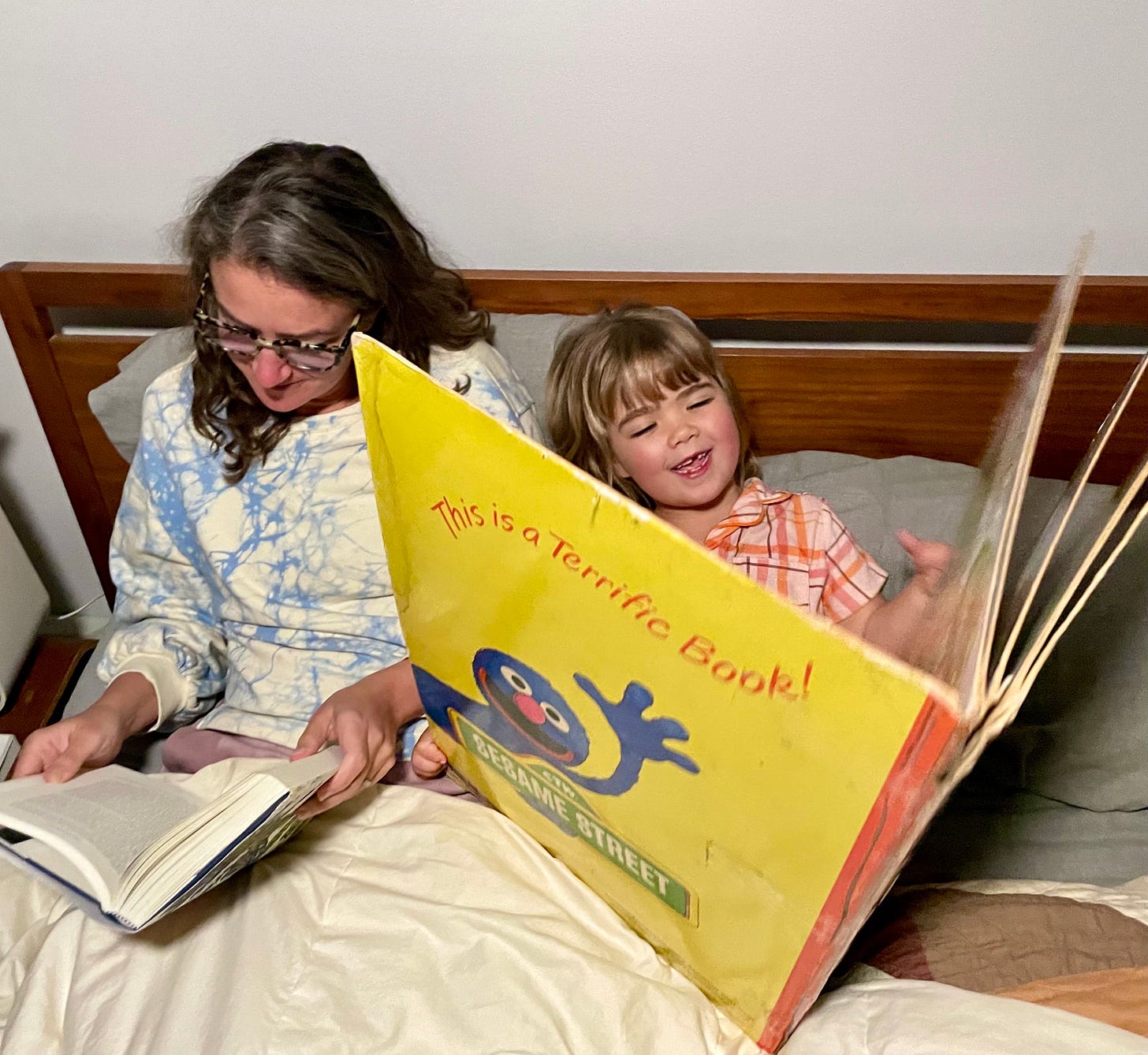I can quit you, baby
doing grown woman shit like rewiring your brain so you're not trying to anticipate everyone's needs all the time
The spring in Oakland is light and lovely. The irises are taller and prouder than they’ve been in years, thanks to all the heavy rain. My kids want to play Sleeping Queens, an addictive card game, outside in the waning light after dinner. There has even been talk about pulling out the old slip-n-slide. It all feels pretty joyful and breezy…and yet, I am doing some heavy lifting these verdant days, emotionally-speaking.
I am trying to disabuse myself of the false notion that I can anticipate everyone’s needs and, thereby, prevent suffering.
I don’t know when and where along the winding way of my life I decided that I, Courtney Martin, had the all-knowing power to detect other people’s desires, needs, pet peeves, ailments, and grievances, and even more than detect, actually do something about them. All of them. I have a feeling it was very early—a strange accumulation of moments where, as a little girl, I watched and made meaning, adding up to a very convoluted, delusional math. I can’t tell a clear, cogent story of these moments, which of course drives me, the writer, bonkers. I just know that somehow I have become very hard-wired to believe that I am responsible for other people’s feelings (or my best guess at what they are).
There’s a bunch of weird things about this hard-wiring. First of all, it’s arrogant. Not arrogant in the way of an Ivy League prick, who thinks they have the right answers for everything, (although, let’s be real, there’s a little of that), but arrogant in the way of a small child, who thinks they have the power to break up their parents’ marriage or cause someone they love to die because they weren’t cute or easy enough. Arrogant, as in wildly wrong about my own power or place in the universe of things.
Another weird thing is that trying to anticipate other’s preferences or needs sometimes feels loving to other people, but often times, it’s alienating and terrible. I get it wrong. Or people feel like I’m trying to fix them. Or I rob people of their own right to say what they need or want. At the very least, when truly vigilant, I’m not fun to be around, because I’m flooded with everyone else’s shit and not capable of being present and playful. So here I am, trying to be loving, and it doesn’t show up as love at all.
The other weird thing is that this hard-wiring makes me, theoretically, masterful at anticipating others’ needs before they even mention them (again, theoretically), but dumb as a box of rocks at identifying or articulating my own. Isn’t that a bitch? I’ve spent 43 years overdeveloping one muscle and mostly neglecting another, so I’m all out of balance and silly looking when I try to just be a person, especially in a family of people I love.
I’m realizing that I formed this delusion as a daughter, but I’ve supercharged it as a mother. Occupational hazard I guess. My role, my right role, is to witness, attune to, and love up on my daughters, to protect them from harm, to delight in getting to know them in all their weird glory. But I also aspire to accompany them through life’s inevitable suffering, not prevent it. In order to nourish them for real life, I can’t spend their childhoods body blocking any pain that I see coming their way.
I also want to model what it looks like for a grown ass woman to identify and articulate her needs clearly and consistently for them. How can that sentence sound so simple when I re-read it and yet so challenging when I try to live into it? The alternative isn’t pretty—martyrdom, resentment, an unlived life that they have to negotiate alongside their own. I don’t want that for them. And, more urgently, I don’t want that for me.
As with any new mindset, I sometimes touch into what it feels like to lay this false notion—that I can anticipate and am responsible for others’ happiness—down. It is freeing. It is light. It feels wise and mature and joyful and, yes, a little scary, but mostly like a gigantic relief. But it is still fleeting. I pick the notion up and wrap it back around myself like a lead-heavy, protective cloak—especially in particular moments with my family or origin or my current family. And then I set it down again. Pick it up. Set it down. Pick it up. Set it down.
I’m learning. I’m rewiring. I’m realizing that this particular notion is linked to so many dynamics in my life. As naturalist John Muir wrote, “When we try to pick out anything by itself, we find it hitched to everything else in the universe.”
He may have been talking about physical ecosystems, but I think it goes for emotional ones too—individuals, families, communities, nations. Our psychic lives are mycelium of adaptive and maladaptive mindsets, first formed in childhood, that we intertwine, under and above ground, with those we love. We over-send some signals. Neglect some until they flash bright and angry. We try to see it all more clearly, understand our own little kid fears and grown up power more accurately, show up differently even as our bodies and brains scream that they know what’s comfortable and they are sticking to it, damn it.
This hard inner and relational work is not without its rewards. The other day, my daughters and I were playing “spa” and my 9-year-old, Maya, was rubbing my calves with lavender lotion and she said, “You’re in your happy place. You’re reading Gay Ross on the couch.”
It made me laugh. Gay Ross, is actually Ross Gay, author of some of my favorite books of the last couple of years. It also made me cry. My daughter has registered what my “happy place” is. I have demonstrated it for her over and over again when I wander away and take up my place on the couch with my sacred object, my book. That’s a start. A beautiful, midlife, clumsy start.






Oh, goodness. The Sleeping Queens years! We played the hell out of that game at my house. Long enough that my kids and I all started wondering out loud at the implications of the King "claiming" his queen. Like, what if she doesn't wanna be claimed? Does anyone ever get to claim anyone anyway? ("I claim you!" I would insist. "Forever and ever you are mine!" "I will always be yours, Mommy, but I might be someone else's too." And my heart would both swell and break in that moment...)
Anyway! I am reminded of this moment when I was in high school, when I got into a fight with my dad because he sat down at the dinner table, looked around, and said, "There's no butter on the table..." He didn't then get up to get the butter. He didn't say, Hey, I'd love butter to go with this meal. Could someone go get it? He just said, "There's no butter" and expected that one of us (my mother, most likely) would immediately interpret this statement as a need and jump up to fetch the butter. I remember saying something smart-aleck, like, What? Are your legs broken? Or, So, go get it! And then he got mad at me and my mom stepped in and got the butter and told me it was no big deal. And I, being about 15 at the time, insisted it WAS ABSOLUTELY A BIG DEAL.
This hypervigilance has so much gender-coding to it. That's how we're taught to be, as female-identified people. But also, certainly in my case, there's generations of enabling behavior that's tied in with the gender stuff because I come from addicts and alcoholics, which included women, but were mostly men. And I was taught, both implicitly and explicitly, that men were just like that and the women of the family were tasked as a result with "taking care of business", which meant hustling and anticipating constantly. It's all freaking exhausting.
I have tried to interrupt this with my own children. Getting divorced helped. But it's still a deeply ingrained tendency that I have to interrupt continually. I don't know that I'll ever be done.
This is so relatable. I grew up in a family with codependent tendencies, and in my childhood as well as adult life tried to manage other people's emotions, predict their needs, and fix their problems. I took on the anxieties and fears of people around me to the point where I couldn't tell what was truly mine and what belonged to others. I've been doing a lot of deconditioning work around this in therapy, learning how to hold space for loved ones without letting what they're going through become *my* problem to solve. I am learning there is a difference between being there for someone, and supporting them, and getting overly emotionally involved and attached to the outcomes of their lives and decisions. It's so tricky! I have been doing grounding work to center my emotional state and be more in touch with how I'm truly feeling, which can help me understand what's "mine" and what's "theirs." This is especially hard with my 5 year old, so the part in your essay about wanting to protect your kids while also acknowledging that part of our job as parents is to help them navigate the complexities and challenges of life really landed for me. Modeling naming feelings and needs is a great start.